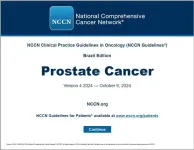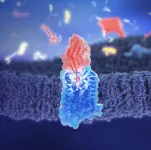ACS president comments on award of 2024 Nobel Prize in Chemistry
2024-10-09
(Press-News.org) WASHINGTON, Oct. 9, 2024 — On behalf of the American Chemical Society (ACS), President Mary K. Carroll congratulates today’s winners of the Nobel Prize in Chemistry: David Baker, of the University of Washington; Demis Hassabis, of Google DeepMind; and John M. Jumper, of Google DeepMind. The Royal Swedish Academy of Sciences awarded the prize with one half to Baker “for computational protein design” and the other half jointly to Hassabis and Jumper “for protein structure prediction.”
“This incredibly complex problem of predicting the 3D structures of proteins from the sequence of amino acids has been one of the biggest challenges in chemistry. We care about this because structure determines function — that’s one of the fundamental tenets of chemistry. The ability to design new proteins goes hand in hand with predicting the structure of proteins,” says Carroll. “The wonderful complexity of proteins has made these formidable tasks, and the solutions have relied on the power of neural networks and sophisticated computational work combined with fundamental knowledge of the underlying chemistry.”
Baker is the winner of the 2014 David Perlman Memorial Award, presented by ACS’ Division of Biochemical Technology. His talk on “The Coming of Age of De Novo Protein Design” is featured in the ACS Publications webinar “Grand Challenges in Bio & Medicinal Chemistry Frontiers in Carbohydrate and Protein Chemistry.” Baker gave a plenary talk on “Post-Evolutionary Biology: Design of Novel Protein Structures, Functions and Assemblies” at ACS Spring 2016.
Jumper is a part of the ACS member community and gave a plenary talk on “Expanding the Role of Machine Learning in Chemistry” at ACS Fall 2023.
Baker and Jumper have published articles in some of ACS’ more than 80 peer-reviewed journals. Baker, Hassabis and Jumper have appeared in news articles on the work in Chemical & Engineering News, ACS’ weekly newsmagazine. Articles are available upon request.
News media can arrange interviews with Carroll or other experts in the field by contacting the ACS newsroom. In addition, ACS will post a special Headline Science short video about the Nobel Prize in Chemistry.
###
The American Chemical Society (ACS) is a nonprofit organization chartered by the U.S. Congress. ACS’ mission is to advance the broader chemistry enterprise and its practitioners for the benefit of Earth and all its people. The Society is a global leader in promoting excellence in science education and providing access to chemistry-related information and research through its multiple research solutions, peer-reviewed journals, scientific conferences, e-books and weekly news periodical Chemical & Engineering News. ACS journals are among the most cited, most trusted and most read within the scientific literature; however, ACS itself does not conduct chemical research. As a leader in scientific information solutions, its CAS division partners with global innovators to accelerate breakthroughs by curating, connecting and analyzing the world’s scientific knowledge. ACS’ main offices are in Washington, D.C., and Columbus, Ohio.
Registered journalists can subscribe to the ACS journalist news portal on EurekAlert! to access embargoed and public science press releases. For media inquiries, contact newsroom@acs.org.
Note: ACS does not conduct research but publishes and publicizes peer-reviewed scientific studies.
Follow us: X, formerly Twitter | Facebook | LinkedIn | Instagram
END
ELSE PRESS RELEASES FROM THIS DATE:
2024-10-09
About The Study: Daily multidisciplinary rounds conducted by a board-certified intensivist through telemedicine did not reduce intensive care unit (ICU) length of stay in critically ill adult patients.
Corresponding Author: To contact the corresponding author, Adriano J. Pereira, M.D., Ph.D., email adrianojop@einstein.br.
To access the embargoed study: Visit our For The Media website at this link https://media.jamanetwork.com/
(doi:10.1001/jama.2024.20651)
Editor’s Note: Please ...
2024-10-09
About The Study: Patients with acute brain injury and anemia randomized to a liberal transfusion strategy were less likely to have an unfavorable neurological outcome than those randomized to a restrictive strategy.
Corresponding Author: To contact the corresponding author, Fabio Silvio Taccone, MD, PhD, email fabio.taccone@ulb.be.
To access the embargoed study: Visit our For The Media website at this link https://media.jamanetwork.com/
(doi:10.1001/jama.2024.20424)
Editor’s Note: Please see the article for additional information, including other authors, author contributions and affiliations, conflict ...
2024-10-09
About The Study: The use of a nonselective extracorporeal blood purification device connected to the cardiopulmonary bypass circuit in a nonemergent population of patients undergoing cardiac surgery was associated with a significant reduction of cardiac surgery–associated acute kidney injury in the first 7 days after surgery.
Corresponding Author: To contact the corresponding author, Xose L. Perez-Fernandez, PhD, MD, email xose74@gmail.com.
To access the embargoed study: Visit our For The Media website ...
2024-10-09
About The Study: Among critically ill adults who received invasive mechanical ventilation for more than 24 hours, screening frequency (once-daily vs more frequent screening) and spontaneous breathing trial (SBT) technique (pressure-supported vs T-piece SBT) did not change the time to successful extubation. However, an unexpected and statistically significant interaction was identified; protocolized more frequent screening combined with pressure-supported SBTs increased the time to first successful ...
2024-10-09
PLYMOUTH MEETING, PA [October 9, 2024] — The National Comprehensive Cancer Network® (NCCN®)—an alliance of leading cancer centers in the United States—announces a renewed collaboration with the Latin American Cooperative Oncology Group (LACOG) to improve cancer outcomes in South America. The international oncology organizations worked together to publish new NCCN Clinical Practice Guidelines in Oncology (NCCN Guidelines®) for Prostate Cancer: Brazil Edition.
The NCCN Guidelines® for Prostate Cancer: Brazil Edition are now available free-of-charge at NCCN.org/global. Additional Brazilian adaptations of NCCN Guidelines ...
2024-10-09
The secret to losing weight could all be down to a combination of 14 ‘skinny genes’, a new study has found.
University of Essex researchers discovered they helped people drop twice as much weight when they ran for half an hour three times a week.
The team - led by Dr Henry Chung, from the School of Sport, Rehabilitation and Exercise Sciences - found those with more of the genes slimmed the most across eight weeks.
People with the most markers lost up to 5kg during the study and people without ...
2024-10-09
EMBARGOED UNTIL OCTOBER 9, 2024 AT 6:30 AM ET
Brigham researchers found people with wide-ranging long COVID symptoms were twice as likely to have SARS-CoV-2 proteins in their blood, compared to those without long COVID symptoms
A persistent infection could explain why some people experience long COVID symptoms, according to a new study led by researchers at Brigham and Women’s Hospital, a founding member of the Mass General Brigham healthcare system. The team found evidence of persistent infection in 43 percent of participants with cardiopulmonary, ...
2024-10-09
Research Highlights:
An analysis of UK Biobank health data that included adults who had mild to severe COVID-19 before vaccines were available found an increased risk of heart attack, stroke and death among those adults during the nearly three-year follow-up period after COVID infection.
The elevated risk of heart attack, stroke and death linked to COVID-19 infection was found to be comparable to cardiovascular risk factors such as Type 2 diabetes, peripheral artery disease and cardiovascular disease.
The study found that having a non-O blood type (A, B, AB) was associated with an increased risk of heart attack and stroke among ...
2024-10-09
Wednesday, October 9, 2024, Cleveland: A history of COVID-19 can double the risk of heart attack, stroke or death according to new research led by Cleveland Clinic and the University of Southern California.
The study found that people with any type of COVID-19 infection were twice as likely to have a major cardiac event, such as heart attack, stroke or even death, for up to three years after diagnosis. The risk was significantly higher for patients hospitalized for COVID-19 and more of a determinant than a previous history of heart disease.
Further genetic analysis ...
2024-10-09
Opioid drugs are highly effective at relieving pain but come with severe drawbacks. Their side effects range from dizziness to potentially fatal respiratory depression. Their illegal use contributes to nearly half a million deaths worldwide each year. Researchers from the University of Geneva (UNIGE) have discovered a molecule, called nanobody NbE, which binds tightly and durably to the cell receptors that usually bind to opioids, thereby blocking the drugs’ activity. Moreover, the scientists were able to create even smaller molecules that retain the same properties, which could prove far more effective than current treatments in ...
LAST 30 PRESS RELEASES:
[Press-News.org] ACS president comments on award of 2024 Nobel Prize in Chemistry

